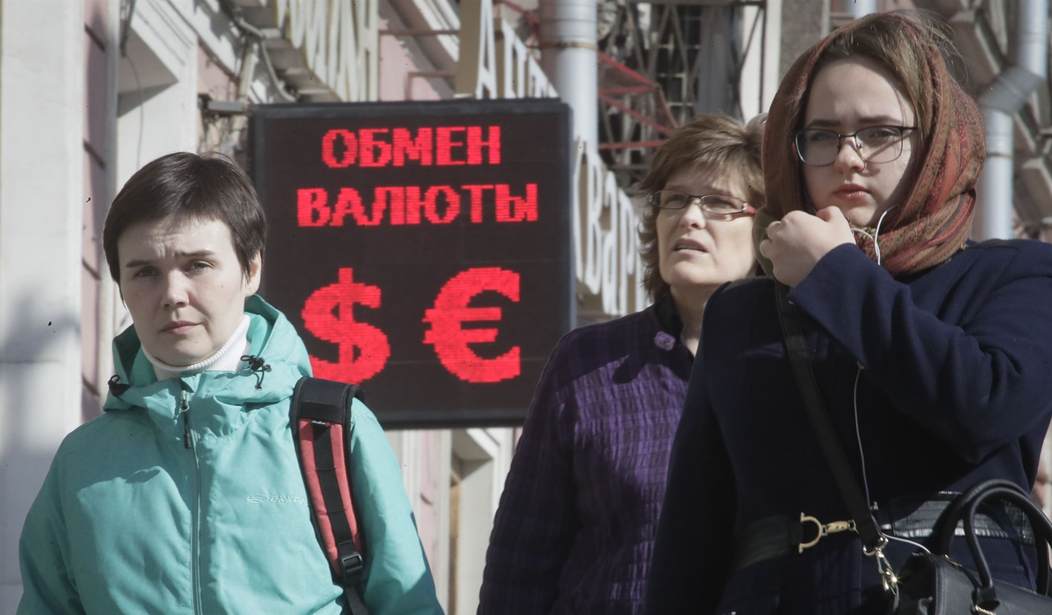When the west began instituting sanctions against Russia the ruble initially went into a nosedive, but the ruble is now trading at the highest level against the dollar that is has since 2020.
The Russian ruble briefly reached its highest level against the dollar since March 2020 on Thursday, supported by capital controls, while stock indexes also climbed as the market watched developments around possible new sanctions against Moscow…
Against the euro, the ruble was 1 percent stronger at 69.77, hovering at levels last seen in February 2020.
Does this mean that Russia has successfully weathered the storm and its economy is now on the rebound? Not really. Last week Bloomberg got a look at a leaked report from the Russian Finance Ministry which anticipated a big contraction of the economy:
Gross domestic product is likely to shrink as much as 12% this year, deeper than the 8% decline expected by the Economy Ministry, according to people familiar with the estimates who spoke on condition of anonymity to discuss internal deliberations. The government hasn’t released a public forecast since the invasion of Ukraine…
A 12% contraction would put the economic pain on par with the turmoil seen in the early 1990s, when Russia’s Soviet-era economy lurched toward capitalism with a contraction not seen since wartime…
If the Finance Ministry’s forecast proves accurate, that would erase about a decade of economic growth, according to one person familiar with the forecasts.
A Russian economist who left the country in 2013 gave an exclusive interview to this Turkish state run news site.
“The initial financial panic has indeed subsided, but that doesn’t mean that the Russian economy is doing well. It’s no way to say the Russian economy is resilient,” said Sergei Guriev, an exiled Russian economist and professor at Sciences Po in Paris…
“Instead of pre-war forecasts of plus 3% growth, recent leaks suggest that internal government forecasts point to a minus 12% GDP change in 2022,” underlined the seasoned academic, who served as rector at the New Economic School in Moscow until he left the country in 2013.
“This is the biggest recession in 30 years,” he added.
Guriev says even the apparent strength of the ruble points to the weakness of the Russian economy.
“Because Russian industries were cut off from the global economy and can’t import anything from the West — pretty much anything except for pharmaceutical goods, basically — Russia doesn’t have demand for dollars, doesn’t need dollars.”
So, it’s running a huge current account surplus and therefore the ruble appreciates, he explained, adding that this was a natural economic outcome of sanctions on important foreign goods.
“And this is not a sign of strength of the economy. It’s a sign of weakness,” he said.
And all of this is just the short term impact. The larger impact will ultimately come from a lack of foreign investment in the Russian economy. Karen has a story coming up later about McDonald’s decision to pull out of the country. They won’t be the only big company deciding to leave Russia behind and the impact of all of those decisions could be huge.
It is the curtailing of FDI [foreign direct investment] by companies headquartered in allied countries that will hurt the most. Russia attracted an annual average of $24.1 billion in FDI from 2015 to 2019. That was down from the pre-Crimea annexation annual average of $36.3 billion from 2010 to 2014.
Coauthors and I estimate that an allied trade embargo against Russia would decrease its real GDP by an estimated 15 percent to 20 percent, and a big chunk of that impact (85 percent to be precise) is driven by FDI suspension or withdrawal. It turns out that curtailing allied FDI is a powerful sanction tool, inflicting colossal damage to the Russian economy at little net economic cost to allied and non-allied economies. Allied governments looking for more efficient sanctions should take note…
We have never seen a country go backwards as fast as it looks like Russia will.
Those investments are unlikely to recover so long as Putin is in charge of Russia. He is probably going to lose the war and all he’ll also have an economy in tatters to deal with.








Join the conversation as a VIP Member